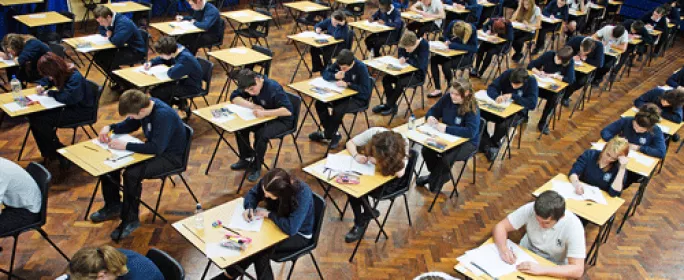OCR chief hits back against government threat of single exam boards
The head of one of England’s big three exam boards has hit back against a government threat to end all competition between awarding bodies.
Mark Dawe, chief executive of OCR, has spoken out after a warning that ministers are dusting off plans to have single exam boards for each subject amid fears of falling standards.
Ministers are considering the move after a public spat by exam boards over practice papers produced for new maths GCSEs. The OCR and Edexcel boards had complained that the papers from rival board AQA were too easy.
But Mr Dawe warned today that ending competition would produce the complete opposite of its desired effect. The dispute, he argues, demonstrates the benefits of having several different exam boards.
“I think this is a perfect example of where competition between exam boards is ensuring there are good standards,” he told TES.
“The regulator has allowed this to happen and two of the exam boards have challenged that decision. If there was one exam board with one regulator this [the challenge] wouldn’t have happened.”
A Department for Education source said: “I think quite the opposite [to Mark Dawe]. This row plainly shows that exam boards, despite repeated warnings from the department, continue to engage in a race towards lower standards for the goal of securing a greater market share.
“This is exactly why we have had to dust off plans to look at going back to one exam board.”
Mr Dawe was also critical of regulator Ofqual’s efforts to resolve the row over practice papers, saying it was giving “mixed messages”. He is due to meet the watchdog next week and is concerned that it is not acting quickly enough over the GCSE maths issue.
“Ofqual have made comments about the need to ensure certain criteria are met by the time the formal exams are sat,” he said
“We think that these things need to be sorted out upfront and transparently now rather than over the next year or so.
“It is something we feel really strongly about and it would be a real shame if it undermined the goals of this government to improve the maths in this country.”
The new maths GCSE to be taught from September is supposed to be both bigger, in terms of content, and tougher than its predecessor, with a greater emphasis on problem solving.
“We do not think what is being proposed in the question papers produced by AQA fulfils those requirements, the problem solving isn’t strong enough,” Mr Dawe said.
Mr Dawe suggested the “best compromise” would be for all boards to produce completely new sets of practice papers and have them approved by Ofqual.
But he said the idea had been rejected. “This is a genuine concern for the good of students in maths education in this country,” Mr Dawe added. “So we will continue to challenge on that basis.”
Ofqual chief regulator Glenys Stacey said there was no reason to ask any exam board to withdraw or amend their practice papers “at this stage”.
“We have the power to require exam boards to amend their sample assessment materials if they are misleading and we will not hesitate to do so should our further work show unacceptable differences between the assessments,” she said.
An AQA spokesperson said: “AQA’s new maths GCSE has been fully accredited by Ofqual and meets all the regulatory guidance. The feedback from teachers is that the papers are clear, well-structured and will provide a positive experience for students while maintaining the right level of mathematical challenge.”
Mr Dawe was speaking just after OCR became the first of the boards to have all 37 of the reformed GCSE, A-level and AS-level qualifications due for teaching from 2015 approved by Ofqual.
Mr Dawe said the board was “delighted” to have reached the milestone but understood that schools were “under enormous pressure to deal with the scale and pace of change” in exams.
Among the approved exams is an OCR English language and literature A-level which the DfE condemned as “rubbish” because its texts included speeches by celebrities including Russell Brand and rap star Dizzee Rascal.
Mr Dawe said the DfE had issued “an immediate reaction rather than looking at what was proposed as a whole”.
“It was one part of a much bigger range of literature and actually was appropriate and that is what the regulator agreed with,” he said.
The DfE has been asked for comment.
Related stories:
Ofqual approves ‘rubbish’ Russell Brand A-level - October 2 2014
Plans to include Dizzee Rascal and Russell Brand in Gove’s ‘more rigorous’ English A-level - May 6 2014
Gove’s A-level reforms will disadvantage pupils in England, warns University of Cambridge - January 20 2014
Keep reading for just £1 per month
You've reached your limit of free articles this month. Subscribe for £1 per month for three months and get:
- Unlimited access to all Tes magazine content
- Exclusive subscriber-only stories
- Award-winning email newsletters




